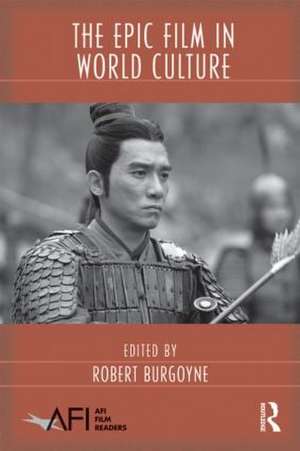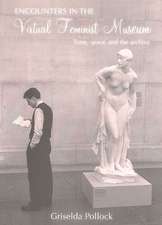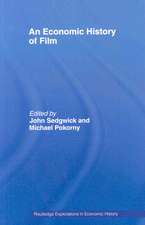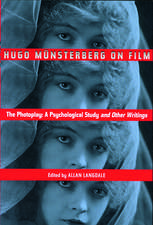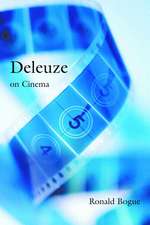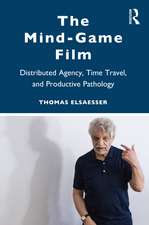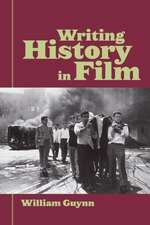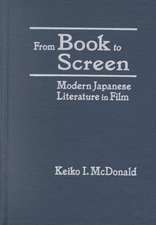The Epic Film in World Culture: AFI Film Readers
Editat de Robert Burgoyneen Limba Engleză Paperback – 6 iul 2010
| Toate formatele și edițiile | Preț | Express |
|---|---|---|
| Paperback (1) | 380.91 lei 6-8 săpt. | |
| Taylor & Francis – 6 iul 2010 | 380.91 lei 6-8 săpt. | |
| Hardback (1) | 1227.09 lei 6-8 săpt. | |
| Taylor & Francis – 6 iul 2010 | 1227.09 lei 6-8 săpt. |
Din seria AFI Film Readers
-
 Preț: 332.54 lei
Preț: 332.54 lei -
 Preț: 291.53 lei
Preț: 291.53 lei -
 Preț: 292.69 lei
Preț: 292.69 lei -
 Preț: 301.65 lei
Preț: 301.65 lei -
 Preț: 289.95 lei
Preț: 289.95 lei -
 Preț: 324.40 lei
Preț: 324.40 lei -
 Preț: 315.07 lei
Preț: 315.07 lei -
 Preț: 487.20 lei
Preț: 487.20 lei -
 Preț: 483.34 lei
Preț: 483.34 lei -
 Preț: 481.38 lei
Preț: 481.38 lei - 18%
 Preț: 1000.27 lei
Preț: 1000.27 lei -
 Preț: 446.37 lei
Preț: 446.37 lei -
 Preț: 335.33 lei
Preț: 335.33 lei -
 Preț: 386.51 lei
Preț: 386.51 lei - 18%
 Preț: 1009.76 lei
Preț: 1009.76 lei -
 Preț: 482.35 lei
Preț: 482.35 lei - 18%
 Preț: 1007.36 lei
Preț: 1007.36 lei -
 Preț: 374.41 lei
Preț: 374.41 lei - 30%
 Preț: 769.10 lei
Preț: 769.10 lei -
 Preț: 440.27 lei
Preț: 440.27 lei - 18%
 Preț: 1019.22 lei
Preț: 1019.22 lei - 18%
 Preț: 1075.74 lei
Preț: 1075.74 lei -
 Preț: 402.98 lei
Preț: 402.98 lei -
 Preț: 355.36 lei
Preț: 355.36 lei -
 Preț: 359.08 lei
Preț: 359.08 lei -
 Preț: 355.20 lei
Preț: 355.20 lei -
 Preț: 442.50 lei
Preț: 442.50 lei - 18%
 Preț: 1218.08 lei
Preț: 1218.08 lei -
 Preț: 346.66 lei
Preț: 346.66 lei - 18%
 Preț: 1002.68 lei
Preț: 1002.68 lei - 25%
 Preț: 852.63 lei
Preț: 852.63 lei -
 Preț: 357.33 lei
Preț: 357.33 lei - 25%
 Preț: 766.49 lei
Preț: 766.49 lei -
 Preț: 354.28 lei
Preț: 354.28 lei - 12%
 Preț: 318.90 lei
Preț: 318.90 lei - 18%
 Preț: 1060.11 lei
Preț: 1060.11 lei
Preț: 380.91 lei
Nou
Puncte Express: 571
Preț estimativ în valută:
72.90€ • 79.15$ • 61.23£
72.90€ • 79.15$ • 61.23£
Carte tipărită la comandă
Livrare economică 23 aprilie-07 mai
Preluare comenzi: 021 569.72.76
Specificații
ISBN-13: 9780415990189
ISBN-10: 0415990181
Pagini: 408
Ilustrații: 25 black & white halftones
Dimensiuni: 152 x 229 x 20 mm
Greutate: 0.57 kg
Ediția:1
Editura: Taylor & Francis
Colecția Routledge
Seria AFI Film Readers
Locul publicării:Oxford, United Kingdom
ISBN-10: 0415990181
Pagini: 408
Ilustrații: 25 black & white halftones
Dimensiuni: 152 x 229 x 20 mm
Greutate: 0.57 kg
Ediția:1
Editura: Taylor & Francis
Colecția Routledge
Seria AFI Film Readers
Locul publicării:Oxford, United Kingdom
Public țintă
Postgraduate and UndergraduateCuprins
Introduction
Section 1: Spectacle
Chapter 1: Monica Silveira Cyrino, "'This is Sparta!' The Reinvention of the Epic in Zach Snyder's 300."
Chapter 2: Kirsten Thompson, "'Philip Never Saw Babylon:' 360 Degree Vision and the Historical Epic in the Digital Era."
Chapter 3: Leon Hunt, "Heroic Chivalry, Heroic Sacrifice: 'Martial Arthouse' as Epic Cinema."
Chapter 4: Robert Burgoyne, "Bare Life and Sovereignty in Gladiator."
Section 2: Center and Periphery
Chapter 5: Dina Iordanova, "'Rise of the Rest:' Globalizing Epic Cinema."
Chapter 6: Bettina Bildhauer, "Signs of the Times: The Semiotics of Time and Event in Sirk's Sign of the Pagan."
Chapter 7: Tom Conley, "The Fall of the Roman Empire: On Space and Allegory."
Chapter 8: Mark Jancovich, "'An Italianmade Spectacle Film Dubbed in English:' Cultural Distinctions, National Cinema and the Critical Reception of the Postwar Historical Epic."
Chapter 9: Ruby Cheung, "Red Cliff: The Chinese-Language Epic and Diasporic Chinese Spectators."
Section 3: Remembering the Nation
Chapter 10: Philip Wagner, "Passing Through Nightmares: Cecil B. DeMille's The Plainsman and the Epic Discourse in New Deal America."
Chapter 11: Bruce Babington, "Epos Indigenized: The New Zealand Wars Film From Rudall Hayward to Vincent Ward."
Section 4: The Family Epic
Chapter 12: Bhaskar Sarkar, in "Epic Melodrama, or Cine-Maps of the Global South."
Chapter 13: Anne Gselvik, "Black Blood: There Will Be Blood."
Section 5: The Body in the Epic
Chapter 14: Alison Griffiths, "The Monstrous Epic: Deciphering Mel Gibson's The Passion of the Christ."
Chapter 15: Saer Ba, "Reading the Black Body in Epic Cinema."
Section 1: Spectacle
Chapter 1: Monica Silveira Cyrino, "'This is Sparta!' The Reinvention of the Epic in Zach Snyder's 300."
Chapter 2: Kirsten Thompson, "'Philip Never Saw Babylon:' 360 Degree Vision and the Historical Epic in the Digital Era."
Chapter 3: Leon Hunt, "Heroic Chivalry, Heroic Sacrifice: 'Martial Arthouse' as Epic Cinema."
Chapter 4: Robert Burgoyne, "Bare Life and Sovereignty in Gladiator."
Section 2: Center and Periphery
Chapter 5: Dina Iordanova, "'Rise of the Rest:' Globalizing Epic Cinema."
Chapter 6: Bettina Bildhauer, "Signs of the Times: The Semiotics of Time and Event in Sirk's Sign of the Pagan."
Chapter 7: Tom Conley, "The Fall of the Roman Empire: On Space and Allegory."
Chapter 8: Mark Jancovich, "'An Italianmade Spectacle Film Dubbed in English:' Cultural Distinctions, National Cinema and the Critical Reception of the Postwar Historical Epic."
Chapter 9: Ruby Cheung, "Red Cliff: The Chinese-Language Epic and Diasporic Chinese Spectators."
Section 3: Remembering the Nation
Chapter 10: Philip Wagner, "Passing Through Nightmares: Cecil B. DeMille's The Plainsman and the Epic Discourse in New Deal America."
Chapter 11: Bruce Babington, "Epos Indigenized: The New Zealand Wars Film From Rudall Hayward to Vincent Ward."
Section 4: The Family Epic
Chapter 12: Bhaskar Sarkar, in "Epic Melodrama, or Cine-Maps of the Global South."
Chapter 13: Anne Gselvik, "Black Blood: There Will Be Blood."
Section 5: The Body in the Epic
Chapter 14: Alison Griffiths, "The Monstrous Epic: Deciphering Mel Gibson's The Passion of the Christ."
Chapter 15: Saer Ba, "Reading the Black Body in Epic Cinema."
Notă biografică
Robert Burgoyne is Professor and Chair of Film Studies at the University of St Andrews. His recent publications include Film Nation: Hollywood Looks at U.S. History, revised and expanded edition (2010), and The Hollywood Historical Film (2008).
Descriere
With the recent release of spectacular blockbuster films from Gladiator to The Lord of the Rings trilogy, the epic has once again become a major form in contemporary cinema. The orginal essays in this volume explore the tension between the evolving global context of film production and reception and the particular provenance of the epic as an expression of national mythology and aspirations, challenging our understanding of epics produced in the present as well as our perception of epic films from the past. Contributors explore new critical approaches to contemporary as well as older epic films, drawing on ideas from cultural studies, historiography, classics, and film studies.
